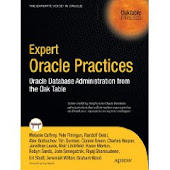This is just a heads-up for those thinking about using
Edition Based Redefinition (EBR) and enabling it on an existing schema with objects. Although EBR isn't exactly a new feature its current adoption level is probably not that high (which probably changes in future as Oracle E-Business Suite uses EBR now as part of their default upgrade procedure as far as I understood).
I was recently contacted by someone who enabled EBR on an existing schema using ALTER USER ... ENABLE EDITIONS and had to use the "FORCE" option since there were (according to the official ALTER USER documentation) "objects that are not editionable and that depend on editionable type objects in the schema. ... In this case, all the objects that are not editionable and that depend on the editionable type objects in the schema being editions-enabled become invalid".
Although one could say it is clearly mentioned in the documentation, the consequences are probably not that obvious to everyone if those non-editionable objects are
tables having columns based on user-defined types. So I state it here to make it hopefully clear enough:
If you use the FORCE option of ALTER USER ... ENABLE EDITIONS to enable editions on an existing schema already containing objects and among those objects are tables having columns based on user-defined types, then effectively those tables will become invalid and stay invalid. There is no officially documented way to reverse this step or compile tables to become valid again (there's no ALTER TABLE COMPILE or similar). The table cannot be accessed any longer and all data contained is hence officially gone, too.
This means the affected tables need to be restored from a (hopefully existing and usable) backup (I don't know if there's a dictionary hack available that is officially sanctioned by Oracle support to make the table valid again).
In my opinion the FORCE option should check if the schema contains such dependent tables and in such a case
error out with an error message that the table needs to be
dropped first (or moved to a different schema) before ENABLE EDITIONS can succeed. This would make the situation much clearer, rather than leaving tables in INVALID state behind that cannot be fixed/recompiled afterwards.
Below is a simple test case that demonstrates the issue:
-- Create a test user for enabling editions
drop user ebr_test cascade;
create user ebr_test identified by ebr_test;
grant dba to ebr_test;
-- Connect as test user
connect ebr_test/ebr_test
-- and create a object relational type
create type test_coll_type as table of number;
-- and a table having such a column of that type
create table test_ebr_table (col1 number, col2 number, test_coll test_coll_type) nested table test_coll store as test_coll_table;
-- Some test data
insert into test_ebr_table (col1, col2, test_coll) values (1, 1, test_coll_type(1, 2 ,3));
commit;
-- Everything is fine so far
select * from test_ebr_table, table(test_coll);
-- Enable editions, FORCE is required
alter user ebr_test enable editions force;
-- This no longer works (ORA-04063: table "EBR_TEST.TEST_EBR_TABLE" has errors)
select * from test_ebr_table, table(test_coll);
-- Not even simple scalar values can be accessed from the table
select col1 from test_ebr_table;
-- The table has gone INVALID
select status from user_objects where object_name = 'TEST_EBR_TABLE';


Wonder why EBR is not widely used?
ReplyDeleteNot me...
helpful post, thanks for putting up that example.
ReplyDelete